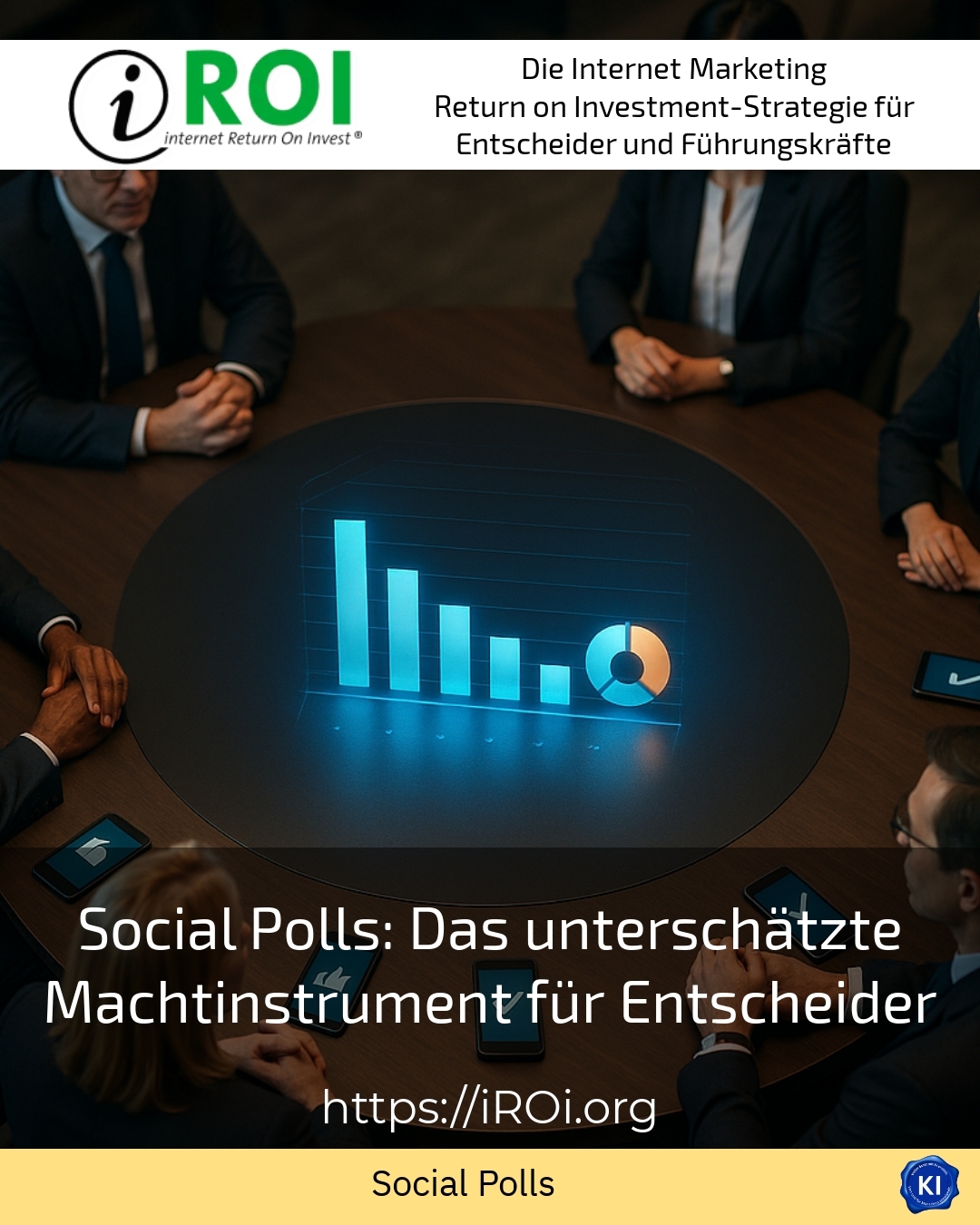Social polls: the underestimated instrument of power for decision-makers
Today, social polls are more than just a playful element on Instagram, LinkedIn or X. They have evolved from a temporary trend to a substantial decision-making tool that is fundamentally changing the dynamics of market communication. Social polls offer decision-makers the opportunity to query opinions, needs and trends in real time, obtain direct feedback and thus support well-founded decision-making processes[1]. Social polls are a practical tool for taking the pulse of your target group, especially in these digital times when customers want to be addressed in an increasingly personalised way.
What makes social polls so valuable
The biggest advantage of social polls lies in the combination of speed, reach and interaction. They make it possible to collect a wide range of feedback within a few hours or minutes. This allows you to find out more quickly which product features are popular with your target group, which colours are preferred or which communication topic is particularly polarising at the moment. Social polls bring engagement to your company profile because they actively involve the target group and initiate conversations. Sharing a social poll on Instagram, X or LinkedIn increases the likelihood that it will be shared further - your content will reach beyond the original circle of followers[1].
Another practical example: many companies use social polls to test new product concepts before they go into development. This shows how social polls help to reduce investment risks and respond more specifically to the needs of your target group. The results of such surveys flow directly into strategy development and ensure closer customer loyalty.
Practical examples: How companies use social polls successfully
Let's take a look at three typical use cases from practice to make the potential of social polls tangible:
BEST PRACTICE with one customer (name hidden due to NDA contract) A medium-sized company from the B2B sector wanted to know whether a planned function in its SaaS platform would really add value. Existing and potential customers were asked via a targeted social poll on LinkedIn. Within two days, it was clear from more than 800 responses that the planned function was only desired by a small group. The development was then stopped, which saved high development costs.
BEST PRACTICE with one customer (name hidden due to NDA contract) A retailer used social polls on Instagram to find out which product ranges should be added to the online shop. The community was able to vote between several options and the winner was quickly added to the product range. The result: a noticeable increase in sales and a community that feels heard.
BEST PRACTICE with one customer (name hidden due to NDA contract) An NGO wanted to know which topic would be the most polarising for the next campaign. With the help of an X-Poll, various focal points were presented and the community was asked to choose the most important topic for them. The campaign gained momentum and achieved a greater reach than expected.
Social polls: how to implement them successfully
Social polls are easy to create, but a clear approach makes all the difference. Start with a precisely formulated question that speaks directly to your target group. Avoid yes/no questions, as open-ended or multiple answers usually provide more valuable insights. Make sure that your survey does not take too long - a short, crisp survey noticeably increases the willingness to participate.
Visual stimuli such as images and short videos increase attention and ensure that your social polls are noticed[2]. Distribute your poll on several channels to address different target groups. Share the results transparently with your community afterwards, as this will keep you in dialogue and strengthen trust in your brand.
One important aspect is continuous analysis. Use the findings from social polls to optimise your content strategy, identify trends early on and offer your customers real added value[3]. Clients often report that social polls not only increase visibility, but also strengthen the loyalty of the community.
Pitfalls and how to avoid them
Social polls are easy, but not every result is representative. Those who dare to share their opinion are often particularly committed or interested - this must be taken into account when drawing conclusions. Therefore, do not expect scientific accuracy, but see the polls as mood pictures that can give you valuable impulses.
To get more variety in the results, it is worth combining social polls with other market research tools. Ask specific follow-up questions under the survey results to gain deeper insights. And remember: social polls are not an end in themselves, but always a building block of a comprehensive feedback culture.
IROI coaching: Social polls as part of your corporate strategy
Many companies face the challenge of integrating social polls into their strategy in a meaningful way. This is where iROI coaching comes in. We support companies, projects and teams in the design, implementation and evaluation of social polls. Together, we develop customised questions, select the appropriate platforms and ensure that the results are actually incorporated into the decision-making processes.
In iROI coaching, you benefit from specific recommendations for action that are tailored directly to your industry and target group. We support you in establishing social polls as a continuous management tool - and not just as a temporary measure. In this way, social polls become a fixed component of your digital communication and help you to become more agile.
Example of successful iROI coaching support
BEST PRACTICE with one customer (name hidden due to NDA contract) A company from the cultural sector wanted to know how its digital offering was being received by its target group. As part of iROI coaching, various social polls were developed on Instagram and LinkedIn that specifically address individual programmes and formats. Continuous evaluation enabled new offers to be created and existing formats to be optimised. Reach increased significantly, customer loyalty was strengthened and conversion rates rose measurably.
BEST PRACTICE with one customer (name hidden due to NDA contract) An online retailer wanted to reduce its returns rate and was looking for the most important reasons for returns. With the help of iROI coaching, social polls were created that specifically asked about customer experiences. The analysis showed that the product descriptions were too brief. After a revision, the returns rate fell by 23 per cent.
BEST PRACTICE with one customer (name hidden due to NDA contract) A training provider wanted to find out which continuing education formats were most in demand. Social polls revealed clear preferences for hybrid learning formats. As a result, the programmes were adapted accordingly, which led to a doubling of enrolment figures.
My analysis
Social polls have long been more than just a digital buzzword. They are a simple but effective tool that bundles real decision-making power in your hands. Social polls help you to identify trends earlier, optimise products and services in a targeted manner and involve your customers as an active part of your development processes. If you use social polls in a consistent and considered way, you not only create more transparency, but also a stronger sense of community. This increases visibility, reputation and ultimately the company's success[1][3].
With iROI coaching, we support companies during implementation and make social polls an integral part of your digital strategy. We show you how to gain valuable insights from votes, opinions and feedback and translate these into concrete measures. In this way, you ensure that your decisions are based on a broad foundation and that your target group really feels understood.
Social polls are an underestimated but powerful tool - your chance to make a lasting impact on digital communication.
Further links from the text above:
Blog: Social media polls as a tool for business strategies
Strategy guide: Social SEO for more reach
Advantages of social media marketing for small businesses
For more information and if you have any questions, please contact Contact us or read more blog posts on the topic internet Return on Investment - Marketing here.
















